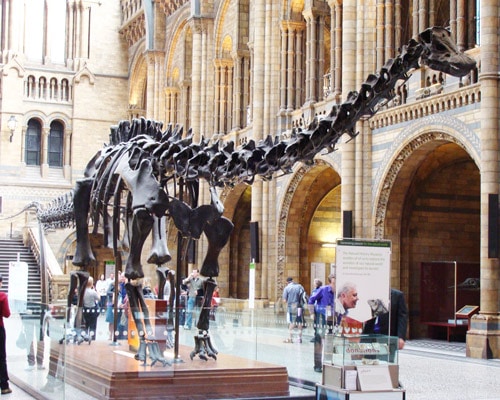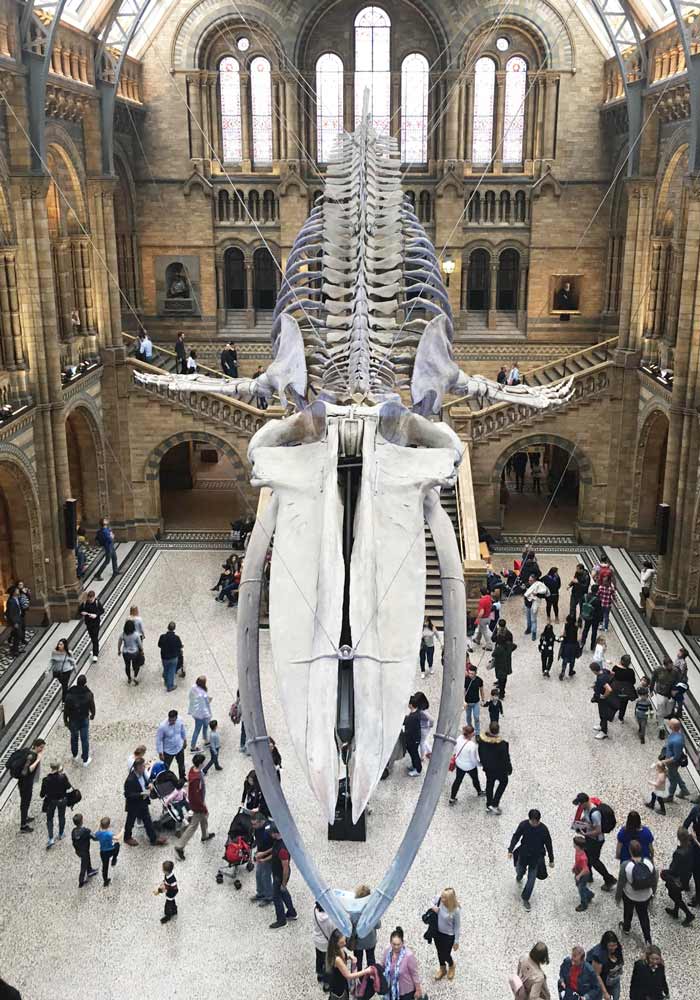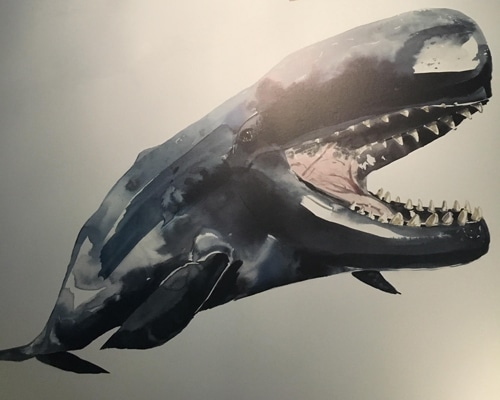Amy Hopkins dives into The Natural History Museum’s latest exhibition, Whales: Beneath the surface, to explore the extraordinary lives of mysterious ocean giants
When the Natural History Museum announced that it would be removing Dippy the diplodocus from its entrance hall in summer 2017, a storm of grief erupted on Twitter. Within hours #savedippy was trending on social media and a national newspaper had launched an online petition to reinstate him. Dippy had lived in the museum’s entrance hall for over 100 years and for a lot of us, seeing the huge dinosaur for the first time was a milestone moment in our childhoods.
However, we should’ve known the Natural History Museum wouldn’t let us down and sure enough, what has replaced Dippy is every bit as magnificent. Visit the museum now and you’ll walk in underneath a 25-metre long blue whale skeleton, named Hope, suspended from the ceiling of the main hall. As well as being a beautiful specimen, Hope signals an important shift, as the Natural History Museum changes its focus from the past to the future.

Dippy the diplodocus

Hope, the magnificent blue whale
Hope’s arrival in the main hall coincides with the opening of the museum’s latest stellar exhibition, Whales: Beneath the surface. I’d wanted to go ever since the mesmerising watercolour posters started popping up in the underground and last weekend, I finally got the chance.
Walking into the exhibition, deep blue lighting and projections of rippling water on the ceiling immediately create a sense of the deep ocean. Passing beneath an arc made of two vast jaw bones, I’m lead through one of planet earth’s most compelling evolutionary journeys, learning how whales evolved over 50 million years from dog-like land mammals to the sea giants we know today.
The secret life of these complex creatures is told through more than 100 remarkable specimens, including vast skulls and skeletons, whale foetuses at different stages of development and brains (which are surprisingly small!). Through natural specimens, graphics, video and cool interactive games, I learn how whales move underwater, regulate their temperature, feed and socialise. Standing beneath the colossal flipper of a blue whale, or walking the length of sperm whale’s spine, it’s impossible not be struck by their sheer scale and majesty.
[soliloquy slug=”whales-beneath-surface-natural-history-museum-london”]
The real joy of this exhibition is the way it evokes the magic and mystery of whales, as well as the science. They are brought to life with extraordinary empathy by beautiful, storybook style watercolour illustrations and exhibits that reveal how they live in family groups and care for each other. I was touched by the caption that accompanied a twisted jaw bone. The bone belonged to a whale which should not have survived, due to its deformity, but was protected by its pod and able to feed and thrive.
For anyone who remembers walking into the Natural History Museum’s great hall and staring up in awe at the dinosaur skeleton, Dippy will always hold a special place in our hearts. But I guarantee your first encounter with Hope the blue whale will be just as special, and a defining moment in the life of thousands of children. Go and see Hope and the Whales exhibition before it ends in February. It’s a fun and fascinating day out that will inspire kids to help protect the incredible species who share our planet.

A stunning watercolour by artist Sarah Maycock
Images in sliding gallery: © The Trustees of the Natural History Museum, London [2017]. All rights reserved.
Where: Natural History Museum, SW7; nearest tube is South Kensington
When: 14 July 2017-28 February 2018
Price: Entry to the museum is free. On the door, adult tickets to Whales: Beneath the Surface cost £12.50 and children’s tickets costs £8.50. A family ticket costs £32.50 – £42.50.